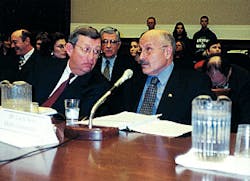Exxon, Mobil to take vote on merger May 27
Exxon Corp. Chairman Lee Raymond, left, confers with Mobil Corp. Chairman Lucio Noto at the House hearing on the merger of their companies.The chairmen of Exxon Corp. and Mobil Corp. say they need to merge into a $77 billion conglomerate in order to stay competitive with national oil companies overseas.
Exxon's Lee Raymond and Mobil's Lucio Noto testified before the U.S. House energy and power subcommittee last week. No congressional representatives at the hearing opposed the merger, which is pending before the Federal Trade Commission (FTC).
And Rep. Joe Barton (R-Tex.), subcommittee chairman, declared, "it's in the national interest of the U.S. to approve this merger."
Raymond and Noto said their stockholders would meet separately May 27 in Dallas to vote on the merger. That vote will probably come before FTC action on their merger request. They said they expect to complete the merger at mid-year.
Advantages
Raymond said, "The merger will mean that Exxon-Mobil will be able to compete in the same scale as the largest foreign firms."Raymond insisted, "Big isn't necessarily bad, in the sense it allows you to do the kind of things you need to do on a worldwide basis. Ultimately everyone benefits from that."
Noto agreed: "Ours is a great business, as long as you're number one or number two."
Raymond observed that the oil business is far less consolidated than some other U.S. industries, such as auto manufacturing.
In a joint statement, Raymond and Noto said the merger would "create synergies and efficiencies enabling the new company to provide high-quality products to consumers at more competitive prices."
Noto and Raymond both emphasized they have slashed their costs due to oil industry competition and low oil prices, and the merger is a good way to achieve further savings.
For instance, Noto said in the last 7 years Mobil has reduced its workforce a third and sold billions of dollars worth of assets. He said, "Now we're getting down to muscle and not fat."
Noto said, because "the status quo just didn't work," Mobil considered acquiring a smaller company or a "merger of equals" before agreeing to the Exxon merger.
"We never put this together because we wanted to be the biggest in anything. We wanted to be the most efficient. Bigness is not bad. It gives you spread and allows you to manage risk," Noto said.
FTC guarded
Earlier, William Baer, director of the FTC's Bureau of Competition, testified about the agency's merger policy but not the status of the Exxon-Mobil merger itself.He said, "Our investigation of the Exxon-Mobil merger is still at an early stage, and neither the commission nor its staff has reached any conclusions about the effects of the merger on competition, or whether the merger violates the antitrust laws in any respect."
Baer said the deal would be the largest industrial merger ever and would create the largest private oil company in the world. It would also be the largest U.S.-based company of any type, when measured by revenues.
He said FTC has learned from prior investigations of oil mergers "that competition is critical to this industry and that concentration can have substantial adverse effects on competition."
He noted that, previously, FTC has paid close attention to the effects that such mergers would have on local and regional gasoline markets. Baer observed, "Exxon and Mobil face each other at just about every level of the industry-exploration for and production of crude oil, refining of crude oil into petroleum products, manufacture of petrochemicals and lubricants, and the marketing of gasoline and other fuels in many parts of the U.S."
Marketers
While the FTC is expected to require the companies to sell some assets-particularly gasoline stations-Raymond and Noto did not offer any concessions. They said that issue was for FTC to determine, and they would cooperate with the agency.Asked if some refineries might be sold, Raymond replied, "I hope not."
Jay Hakes, Energy Information Administration head, said the two companies' largest overlap of marketing is in the Northeast U.S., where, together, they have more than 15% of the branded retail stations.
Representatives of service station dealers and gasoline marketers expressed concern about how the merger might affect them, fearing it might force some out of business, especially in the Northeast.
Tom Reidy, an Exxon dealer in the Maryland suburbs of Washington, D.C., testified for the Service Station Dealers of America. He said dealers are concerned the merged company might "squeeze out" independent dealers, resulting in higher wholesale gasoline prices.
Reidy said, if FTC requires the sale of company-owned stations, the lessee dealers should be given an opportunity to buy them.
Charles Shotmeyer, whose family owns a chain of Mobil stations in New Jersey, said Exxon and Mobil may have 35% of the retail gasoline market there.
Copyright 1999 Oil & Gas Journal. All Rights Reserved.
